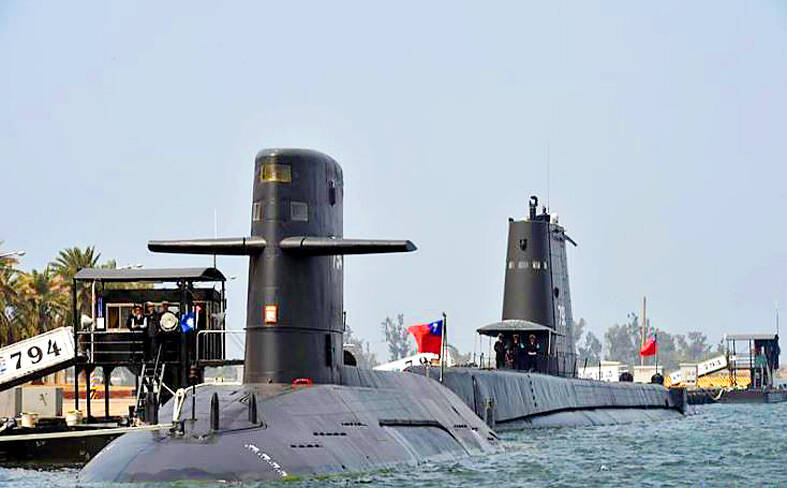The Indigenous Defense Submarine (IDS) prototype is expected to undergo a harbor acceptance test in September, a sea acceptance test in February next year and, if it passes, be delivered to the navy in the first half of 2025 instead of November 2025, defense officials said yesterday.
The goal of the IDS program is to create a fleet of nine to 11 domestic diesel-electric submarines that would defend the waters around Taiwan, the officials said, speaking on condition of anonymity.
The IDS prototype features a partial double-hull design consisting of six pressurized compartments and a conning tower, which have been completed, certified and are undergoing encapsulation, they said.

Photo: Taipei Times, file photo
The boat would be 70m long, 8m wide and 18m high, including the conning tower, and have a displacement of 2,500 tonnes to 3,000 tonnes, the officials said.
It would have a pair of stabilizing fins on the sides of the conning tower and an X-shaped tail rudder, they added.
The submarine’s weapons would include 18 MK 48 Mod 6 heavyweight torpedoes and an undisclosed number of Harpoon missiles, they said.
There is reason to believe that due to improved program management the prototype could be completed ahead of schedule in early 2025 or before that, if system tests are successful, the officials said, adding that the project had generous time buffers.
Meanwhile, the Chungshan Institute of Science and Technology is poised to deliver the first of its upgraded operational systems for the navy’s aging Chien Lung-class submarines late this year, the officials said.
The navy is overhauling the operational systems used in the Hai Lung and Hai Hu Chien Lung-class submarines, as they are becoming obsolete, they said.
The NT$7.41 billion (US243.32 million) project aims to produce two systems for immediate use and one to be held in reserve, they said.
The project was to be completed next year, but the deadline has since been pushed forward three years due to difficulties in obtaining sensitive technology from overseas, the officials said.
The systems would be delivered one at a time from next year through 2026, with the certification of all systems to be completed at a dedicated testing facility in 2027, they said.
Research and development, systems integration and the sourcing of systems and components from foreign manufacturers is being managed by the institute under supervision of the navy, they added.

Auckland rang in 2026 with a downtown fireworks display launched from New Zealand’s tallest structure, Sky Tower, making it the first major city to greet the new year at a celebration dampened by rain, while crowds in Taipei braved the elements to watch Taipei 101’s display. South Pacific countries are the first to bid farewell to 2025. Clocks struck midnight in Auckland, with a population of 1.7 million, 18 hours before the famous ball was to drop in New York’s Times Square. The five-minute display involved 3,500 fireworks launched from the 240m Sky Tower. Smaller community events were canceled across New Zealand’s

The Ministry of Foreign Affairs (MOFA) yesterday said it is closely monitoring developments in Venezuela, and would continue to cooperate with democratic allies and work together for regional and global security, stability, and prosperity. The remarks came after the US on Saturday launched a series of airstrikes in Venezuela and kidnapped Venezuelan President Nicolas Maduro, who was later flown to New York along with his wife. The pair face US charges related to drug trafficking and alleged cooperation with gangs designated as terrorist organizations. Maduro has denied the allegations. The ministry said that it is closely monitoring the political and economic situation

‘SLICING METHOD’: In the event of a blockade, the China Coast Guard would intercept Taiwanese ships while its navy would seek to deter foreign intervention China’s military drills around Taiwan this week signaled potential strategies to cut the nation off from energy supplies and foreign military assistance, a US think tank report said. The Chinese People’s Liberation Army (PLA) conducted what it called “Justice Mission 2025” exercises from Monday to Tuesday in five maritime zones and airspace around Taiwan, calling them a warning to “Taiwanese independence” forces. In a report released on Wednesday, the Institute for the Study of War said the exercises effectively simulated blocking shipping routes to major port cities, including Kaohsiung, Keelung and Hualien. Taiwan would be highly vulnerable under such a blockade, because it

UNRELENTING: China attempted cyberattacks on Taiwan’s critical infrastructure 2.63 million times per day last year, up from 1.23 million in 2023, the NSB said China’s cyberarmy has long engaged in cyberattacks against Taiwan’s critical infrastructure, employing diverse and evolving tactics, the National Security Bureau (NSB) said yesterday, adding that cyberattacks on critical energy infrastructure last year increased 10-fold compared with the previous year. The NSB yesterday released a report titled Analysis on China’s Cyber Threats to Taiwan’s Critical Infrastructure in 2025, outlining the number of cyberattacks, major tactics and hacker groups. Taiwan’s national intelligence community identified a large number of cybersecurity incidents last year, the bureau said in a statement. China’s cyberarmy last year launched an average of 2.63 million intrusion attempts per day targeting Taiwan’s critical